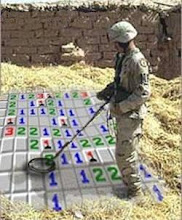The following article is from this source.
Consumer reports finds dangerous herbal products sold over the counter
The current issue of Consumer Reports will stand your hair on end, especially if you are taking herbs to improve your health and/or to avoid the side effects that usually go with drugs. The FDA classifies these products as dietary supplements, a designation that amounts to a free pass for the manufacturers. Unlike drugs, there is no required testing for proof of safety or effectiveness.
Supplements can be purchased over the counter and over the Internet. The lack of government regulation allows them to be regarded as "innocent 'til proven guilty." Even when the FDA has clear proof of danger, as it did with the herbal weight-loss aid, ephedra, it can take years to get the product banned. Furthermore, manufacturers are allowed to market their products as "natural," which to most consumers implies harmless.
The Dirty Dozen
The May issue of Consumer Reports identified 12 herbal ingredients that are linked to serious adverse events, "or, in the case of glandular supplements, to strong theoretical risks." Labeled "the dirty dozen," the ingredients are available individually or in multi-ingredient combination products. Consumer Reports, which is published by the non-profit Consumers Union, divided the following ingredients into three categories: definitely hazardous, very likely hazardous, and likely hazardous:
--Aristolochic acid is judged to be "definitely hazardous" because of documented kidney failure (sometimes requiring transplant), deaths, and known potent cancer-causing properties. What makes things difficult even for consumers who carefully read the label is this: the offending ingredient can appear under many different names. (The multiple names for aristolochic acid are listed in the Consumer Reports article.)
--Comfrey, androstenedione, chaparral, germander, and kava are classified as "very likely hazardous" because they are banned in other countries; have generated an FDA warning; or are identified as causing adverse effects in studies. Each is known by more than one name. Abnormal liver function or damage, often irreversible, and deaths have been reported for chaparral, comfrey, germander, and kava.
--Bitter orange, organ/glandular extracts (brain/adrenal/ pituitary/placenta/other gland "substance" or "concentrate"), lobelia, pennyroyal oil, skullcap, and yohimbe are considered "likely hazardous." This category applies to ingredients for which there have been adverse-event reports or because of theoretical risks. Each is known by several different names. Referring to glandular products, Consumer Reports states that the FDA has banned high-risk bovine materials from older cows in foods and supplements, but has not banned high-risk parts from cows under 30 months. There is a theoretical risk of mad cow disease, particularly from brain extracts.
Not the FDA's Fault
Consumer Reports does not fault the FDA for this situation that puts so many at risk. Congress has created the regulatory barriers to appropriate testing of these products. Furthermore, there is no mandatory reporting system as there is for drug companies. Though this mandate is notoriously ineffective, as it is well known that fewer than 10% of adverse reactions to drugs are reported to the FDA, the system should be strengthened and expanded to include dietary supplements.
What you can do:
--For free access to the article about Dangerous Supplements, go to www.consumerreports.org, or buy the May 2004 issue of Consumer Reports.
--Go to www.bmj.com and locate the April 24 issue of the British medical journal, BMJ. Find the rapid responses to the news item entitled, US consumer group names "dirty dozen" dietary supplements. Read the objections to the Consumer Reports assessment from Michael McGuffin, president of the American Herbal Products Association. For example, he contests the listing of skullcap as presenting a danger of abnormal liver function or damage. "The only suggestion of such a danger was associated with an incident of misidentification of skullcap in a product that, in fact, contained germander and did not contain skullcap."
--Visit www.ConsumerLab.com This Web-based organization describes itself as an independent testing service for consumer products, including herbal products, vitamins, minerals, sports and energy products, functional foods, food and beverages, as well as personal care products. ConsumerLab.com issues "concerns and cautions" about specific products. Its testing centers on factors related to quality, such as the critical issue of whether the ingredients and amounts listed on the label accurately reflect what is in the product. Testing criteria also include purity (Is the product free of contaminants?), bioavailability (Does the product break down properly so that it may be used by the body?), and consistency (Does each unit of the product have the same identity, potency and purity?)

No comments:
Post a Comment